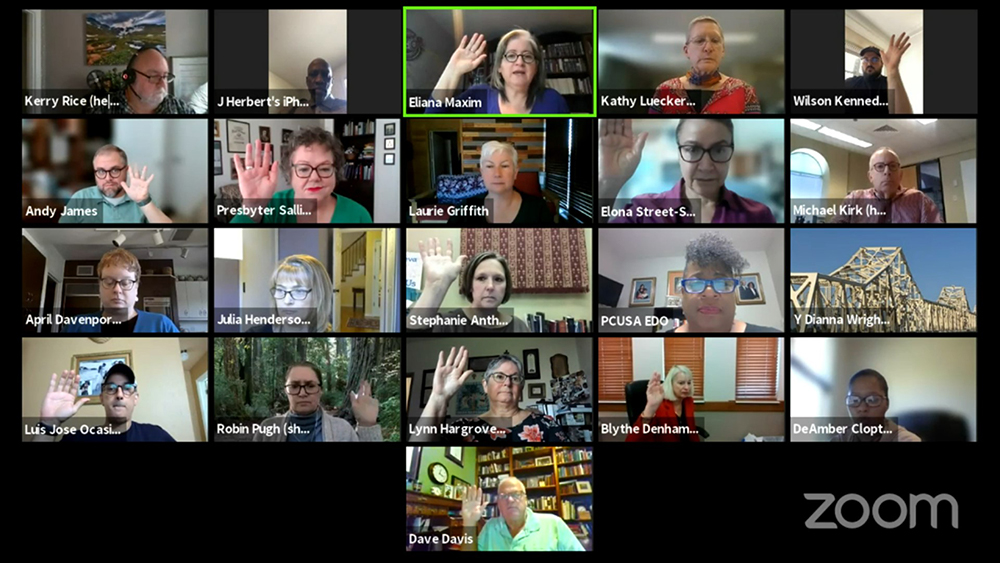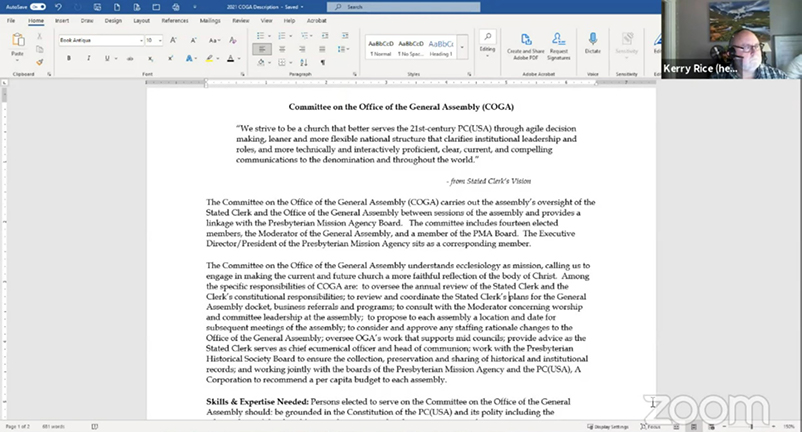
The Committee on the Office of the General Assembly (COGA) meets via Zoom on September 29, 2021.

The Committee on the Office of the General Assembly (COGA) meets via Zoom on September 29, 2021.
The Committee on the Office of the General Assembly (COGA) concluded its three-day fall meeting Wednesday with a series of votes about General Assembly 225 (GA 225).
The committee also discussed plans for assemblies beyond next summer and recruiting and orienting future COGA members.
Meeting virtually, and building off discussions from day 1 and day 2, COGA members voted unanimously to approve the following workgroup recommendations on the meeting agenda:
- Events workgroup recommendations to (1) not include an exhibit hall in the GA 225 program [Item 2.3] and (2) allow direct access by agencies, entities and other permanent committees that report directly to the General Assembly to commissioners during committee work [Item 2.4]
- Process and Discernment workgroup recommendations that (1) overture advocates appointed by presbyteries participate in assembly committees by virtual means through a prerecorded presentation and/or a real-time video connection [Item 2.5]; and (2) resources persons from General Assembly agencies, entities and other permanent committees that report directly to the General Assembly be given the option to participate in deliberations of assembly committees through in-person or virtual means [Item 2.6]
- A staff recommendation that the per diem amount for General Assembly 225 commissioners and delegates while in Louisville be set at $57 [Item 2.7].
Two more unanimous votes authorized future planning for specific aspects of GA 225 and for later churchwide gatherings [Item 2.8]:
- A recommendation instructing national church staff to develop GA 225 plans connected with Chaplains, Language Hospitality, Moderating Online Spaces, Moderator/Co-Moderator Engagement, Hospitality Teams and Local Arrangements with Mid-Kentucky Presbytery, Learning Session Details, Commissioner Training Strategy and Tools, and Leader Briefing; and
- A recommendation referring items of business from previous workgroups to new COGA workgroups, including a proposal on BIPOC gatherings during the GA 225, the role of Advisory Delegates in future assemblies, Big Tent conversations, and utilizing the full two-year terms of commissioners and delegates in future assemblies.
“We made a lot of decisions in a short amount of time,” the Rev. Eliana Maxim said after the votes. The previous days’ discussions had made the quick voting possible.
Later in the meeting, COGA members gathered for the first time in three new workgroups.
Those groups will work with church staff to implement plans for GA 225, plan for GA 226, and enable the review of General Assembly Standing Rules, a process that the Rev. Stephanie Anthony said will “help bring some of the standing rules into the 21st century, and match our values and the direction the church is moving in.”
After the new workgroups, individuals proposed revisions to the job description for future members, including added language about discernment, vision, General Assembly experience, and skills. Members also proposed making more prominent preexisting language encouraging applicants of color and applicants involved with ministries that assist people of color.
The refined job description will be forwarded to the General Assembly Nominating Committee as they consider nominees for service.

COGA reviewing draft job description, September 29, 2021.

COGA reviewing draft job description, September 29, 2021.
COGA also discussed ways to onboard the next class of members following GA 225, and how to better orient future members, including the possible use of an intercultural development inventory to foster work around issues of race and justice.
Kerry Rice, Deputy Stated Clerk of the Office of the General Assembly, said, “The COGA coordinating committee will be looking at what onboarding needs to look like.”
“The hope is to bring more intentionality to the process,” Rice said, “so everyone can be as effective as they can be in their role.”
COGA’s next full meeting is scheduled for February 7-9, 2022.
Learn more about COGA here. Watch recordings from the fall meetings here.
